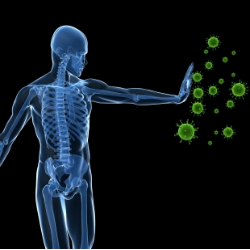Your child’s immune system has changed. How do you protect her from infection?

Our immune system, a network of cells, tissues and organs, plays an important role in keeping us well. Simply put, this is the gatekeeper for anything that enters our bodies, determining whether it’s harmful or harmless, and acting accordingly. When bacteria or viruses enter the body, the body’s cells take action. Some produce antibodies, which are infection-fighting proteins. White blood cells attack bacteria directly. It’s these and other immune-system actions that can prevent a child from getting sick in the first place, or help him recover if he does become ill.
Reducing the probability of infection: it’s in your hands
Reducing the probability of infection: it’s in your hands
Your child’s immune system may be weakened because of certain medical conditions, or because of the medication treatments themselves. In a case like this, it’s important that you do all you can to lessen the probability of infection. As a first step, always wash your hands, especially after using the toilet; changing diapers; handling garbage; using a cleaning cloth or dishrag; handling meat, eggs or other raw food; touching a pet; blowing or even touching your nose; or after any contact with vomit, blood or any other body fluids. You should also wash your hands before touching your child, preparing food, or eating.
Environment is key
Environment is key
You will have to keep a close eye on your home environment too. Dust and vacuum on a weekly basis. The same goes for washing your child’s bed sheets, towels and pyjamas – that’s another weekly chore. Use hot water for dish washing too. And be sure to wash the bathroom and kitchen and living room with disinfectant. You will also need to pay close attention to cleanliness for frequently touched items such as door handles, telephones and faucets, wherever they are in the house. Keep those toys clean too, and clean your humidifier daily.
Safe food preparation practices
Safe food preparation practices
Wash your hands before and after food preparation. Cleanliness is critical. Wash fruits and vegetables too, and keep meat, poultry and fish separate from cooked food in the refrigerator. Frozen meat should be thawed in the refrigerator only. Clean utensils and cutting board (plastic only) immediately after use. Cook your meat thoroughly, avoid deli meats, and use a separate cutting board for meat. All dairy products should be pasteurized, and kept refrigerated. Do not give your child any food that has been left at room temperature for more than two hours if it should be refrigerated; and don’t give any food that contains raw eggs or has expired.
Be aware of immunosuppression
Be aware of immunosuppression
Ask your family physician about the level of severity of your child’s immunosuppression – that is, the efficacy of his or her immune system at a given time. For severe cases you need to take some suggested precautions. The first is to keep your child away from crowds. You will also need to avoid daycare and group play during treatment, as well as parks, sandboxes and public swimming pools. Around the home, you will need to limit sharing of household items, including toys, towels and utensils. Plus, you will need to screen all visitors for illness – if they’re not well, they should not visit at all. In the event they do visit, these ill visitors should wash their hands thoroughly. In public places, put a cover on the stroller; or a mask on an older child. And avoid medical waiting rooms if possible. Ask for an early morning or end-of-day appointment. Be sure to advise the doctor’s staff about your child’s lowered immune system.
Vaccinations are important
Vaccinations are important
Keep tabs on other family members’ immunizations too – including their annual flu vaccinations. These should be updated regularly. If the whole family is immunized, then risk of exposure to infection is reduced for your child. You should be cautious, however, when it comes to chickenpox and rotavirus vaccines. If a family member develops a rash after a chickenpox vaccine, that relative should stay away from the child. Contact your doctor if your child comes into contact with chickenpox. Rotavirus vaccine recipients should be particularly vigilant about hand washing, since this virus may be living in their feces. Talk to your physician about updating your child’s vaccines four to six weeks before beginning treatment.
Other precautions
Other precautions
Be careful about pets too – and the surfaces and materials they have come into contact with. Your child should not have any contact with pets or these surfaces. If you’ve been in contact with a pet, hand washing is a must. And of course, be mindful of the dangers posed by second-hand cigarette smoke to your child, especially in his immunosuppressed condition.
Contact your doctor within 24 hours if your child develops fever, cough, runny nose, breathing problems, nausea, vomiting, loss of appetite, diarrhea, foul-smelling urine, pain when urinating, frequent urination, thrush (white spots in the mouth or in the diaper area), rash or increased sleepiness.


